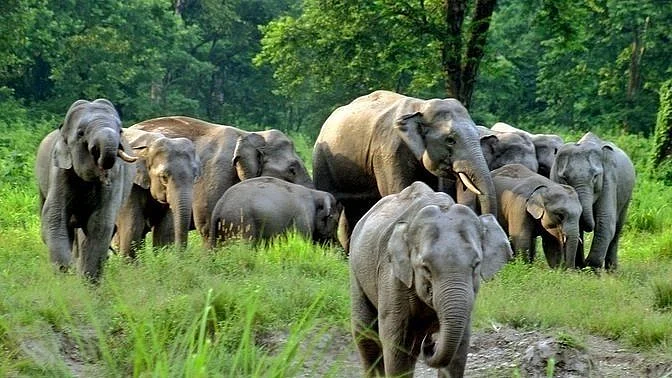Despite being a cultural icon in India and throughout Asia, elephant numbers have been on a decline because of habitat loss and encroachment into protected areas.
The 2017 wildlife census indicated that India had just 27,000 elephants across 23 states. This was a surprisingly low number considering over 60% of the Asian elephant population is supposed to be in India.
Rampant Poaching, Human-Elephant Conflict and Shrinking Habitats
However, conversations on elephant conservation began to pick up, and strategies for preserving habitat were developed taking into account the significance of these majestic animals in an ecosystem.
Elephants help maintain biodiversity of the ecosystems they inhabit; they make pathways in dense forests which creates passages that can be used by other animals as well. In fact, an elephant footprint, when filled with water, also serves as a micro-ecosystem that provides home to tadpoles and other organisms.
Rampant poaching, human-elephant conflict and shrinking habitats needed to be addressed urgently, which prompted us to start large-scale plantation initiatives in popular elephant habitats so that we could create dense buffer zones and expand wildlife corridors.
Restoring the natural habitat of elephants by organizing plantation drives or even supporting elephant conservation efforts is something we can all do to protect these majestic and innocent animals.
Sadly, mankind has reached a point where we all need to be conscious of our actions to avert a further decline in environment and wildlife numbers.
Thus, when we are amid wildlife, the seemingly harmless act of geotagging can invite poachers to track and hunt down endangered elephants, tigers, and other species that may be on the verge of extinction.
Instead, we can turn off the GPS location on our mobile phones and mention the location in a general way to avoid putting our wildlife at risk.
How to Reduce the Man-Elephant Conflict?
In addition to expanding wildlife corridors to reduce man-elephant conflict, we also need to take some preventative measures.
Crop location planning, planting food crops away from the fringes of elephant habitats, and using olfactory repellants like tiger urine, pepper-dung, or grease and hot pepper can be used to prevent man-elephant encounters.
Physical barriers such as electrified fencing and powerful spotlights can also be used to keep elephants away from human settlements.
An award-winning documentary, ‘Elephants in the coffee’ highlights the growing tension between coffee growers and elephant populations in Karnataka where over 70% of India’s coffee is produced.
We may be unintentionally responsible for removing elephants from their natural habitats, even if this may never be brought to our attention.
Cardamom, ginger, vanilla, and other spices found in coffee plantations also attract animals that feed on flora, and when elephants encroach on plantations, a human-elephant confrontation can swiftly spiral out of control.
We need to ensure that we patronize a coffee brand that has been certified by Forest Stewardship Council (FSC) as Fair Trade. An FSC certificate ensures that the plantations were managed responsibly.
'When Among Wild Creatures, We Should Act Ethically'
We need to keep in mind as consumers that we influence how businesses assess market demand and adjust their operations.
When we exhibit a strong interest in ivory products, it signals to vendors that there is public support for elephant poaching. The least we can do to demonstrate our solidarity with elephants is to avoid purchasing anything made of ivory.
According to a 2017 report by World Animal Protection, upto 3000 elephants are kept in captivity in tourist destinations across Asia and are not given enough food and water.
To give visitors rides, newborn elephants are frequently abducted from their mothers. If you enjoy wildlife safaris, be sure to pick one that doesn't injure or disrupt wildlife or other species.
Elephants should not be given bananas or coconut leaves since this accustoms them to humans. They might end up in densely populated places as a result of this, where a confrontation with people might become unavoidable.
When among wild creatures, we should act ethically. Before choosing a tour operator, check their websites to determine if they adhere to the standards for wildlife and environmental conservation.
We play a crucial role in highlighting what elephants and wildlife mean to us. By actively supporting elephant conservation efforts, we can lower the demand for ivory, deter illegal poaching, and promote the importance of these animals in a balanced ecosystem.
(Bikrant Tiwary is the first CEO of Grow-Trees and the former National Head of GiveIndia, the largest philanthropic online platform.)
(This is an opinion article and the views expressed are the author's own. The Quint neither endorses nor is responsible for them.)
